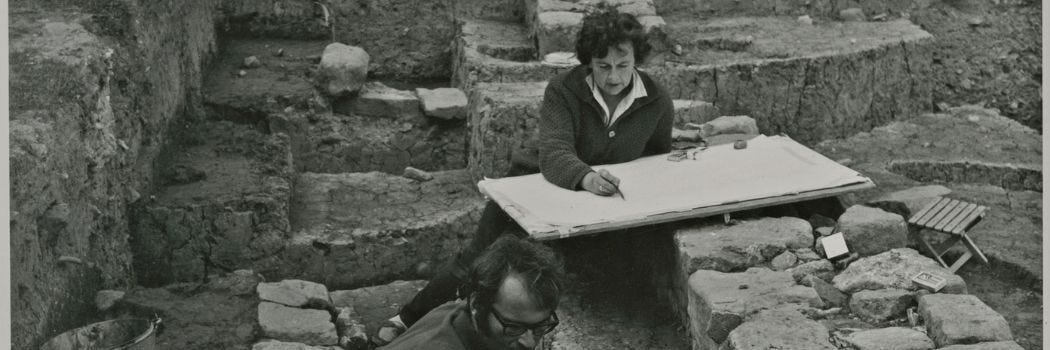Heritage Lottery grant green lights new excavation effort
Funding finances new exploration at one of North East’s most important historic sites. Tony Henderson reports
Excavations are to resume at one of Tyneside’ most historic sites.
The monastery at Jarrow was one of Europe's most influential centres of learning and culture in the Seventh century and home to the Venerable Bede, who is buried in Durham Cathedral.
From 1959 to 1978, Durham University’s Anglo-Saxon expert Professor Rosemary Cramp excavated at the twin monastery site of Jarrow-Wearmouth, with another dig taking place in 1984.
The team discovered remains of the Seventh and Eighth-century building at Jarrow, which are under the care of English Heritage.
Now Jarrow Hall Anglo-Saxon Farm, Village and Bede Museum has been awarded £249,188 by The National Lottery Heritage Fund to open excavations in Drewett’s Park adjacent to St Paul’s Church.
Past scans have indicated an area of interest at the park, and Northumbria University plans a new survey with ground penetrating radar in June. The project will also involve Durham and Newcastle universities.
The funding will pay for the first phase of the investigation, starting this summer, with hopes for a second next year.
Phase one will create opportunities for local residents and school children to be involved in the archaeology.
Jarrow is regarded as one of the most important early medieval monastic sites in England and the excavations by Rosemary Cramp, Durham’s first female professor of archaeology, produced finds which form the existing collection at the site’s Bede Museum.
The grant continues the legacy of Dame Rosemary, who died two years ago, aged 93, by investigating a new area within what is also known as Charley’s Park that has been previously unexplored.
Volunteers, students and local groups will be able to take part in the mission through events and training, with an archaeological club for young people and an annual festival of archaeology hosted at Jarrow Hall, allowing even more people to learn and play a part in Jarrow’s archaeological heritage.
Groundwork South and North Tyneside acquired the former Bede’s World site in Jarrow after an approach from South Tyneside Council following its closure in 2016.
The 11-acre area contains a museum dedicated to celebrating the life of the Venerable Bede and telling the story of Anglo-Saxon England with a focus on the importance of the Jarrow-Wearmouth monastery, and the Kingdom of Northumbria at the height of its power and importance on the world stage in the early Middle Ages.
The site includes a reconstructed Anglo-Saxon farm and the 18th Century Georgian Jarrow Hall House.
Andrew Watts chief executive at Groundwork South and North Tyneside, said: “We are thrilled to have received this support from The National Lottery Heritage Fund. Thanks to National Lottery players we are able to bring archaeology to more communities in South Tyneside.
“Through these new accessible programmes and events we are opening doors for people to learn new skills and potentially sparking an interest for future careers.
“We know from working with university partners and careful scanning that there may be something exciting to find. The excavation explores a missing piece of the puzzle for Jarrow, possibly telling more about what life was like for everyday people in the times of Bede.”
Founded by Benedict Bishop in the late Seventh century, the monastery achieved an international reputation but there was almost no archaeological knowledge of the site until the excavations undertaken by Prof Cramp.
The digs unearthed the greatest quantity of seventh to eighth-century coloured window glass from any site of comparable date in Europe.
Excavations produced hundreds of fragments of the rare Anglo-Saxon glass, some of which were used to create a circular window at St Paul’s Church.
The remains standing today are from the medieval monastery, but part of the Anglo-Saxon monastery survives today as the chancel of St Paul's Church.
Northumbrian Water hires UK’s first in-house archaeologist
In what is a UK first, Northumbrian Water has recruited an archaeologist to help it protect the past, while it builds for the future.
Newcastle-based Ben Moore has landed the newly-created role, which will see him working alongside engineers on infrastructure projects.
Whether it’s a major pipeline upgrade or routine maintenance, Ben, whose career as an archaeologist spans 25 years, will monitor the company’s projects so that sites are archaeologically assessed before construction begins.
He will also ensure that any discoveries are identified, recorded, and preserved in line with guidance from Historic England and the local authorities.
In 2021 a stretch of Hadrian’s Wall which was uncovered by Northumbrian Water workers in Newcastle.
Ben said: “During our work we often have to dig beneath the surface and there’s a good chance we could be revealing history. Northumbrian Water’s work gives archaeologists a chance to add to our understanding of the past in the area”.






